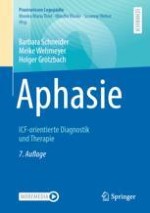Zurück zum Zitat Breitenstein C, Grewe T, Flöel A, Ziegler W, Springer L, Martus P, Huber W, Klaus Willmes E, Ringelstein B, Haeusler KG, Abel S, Glindemann R, Domahs F, Regenbrecht F, Schlenck K-J, Thomas M, Obrig H, de Langen E, Rocker R, Wigbers F, Rühmkorf C, Hempen I, List J, Annette Baumgaertner A, Villringer MB, Jöbges M, Halm K, Schulz J, Werner C, Goldenberg G, Klingenberg G, König E, Müller F, Gröne B, Knecht S, Baake R, Knauss J, Miethe S, Steller U, Sudhoff R, Schillikowski E, Pfeiffer G, Billo K, Hoffmann H, Ferneding F-J, Runge S, Keck T, Middeldorf V, Krüger S, Wilde B, Krakow K, Berghoff C, Reinhuber F, Maser I, Hofmann W, Sous-Kulke C, Schupp W, Oertel A, Bätz D, Hamzei F, Schulz K, Meyer A, Kartmann A, Som O'N, Schipke S-B, Bamborschke S (2017) Intensive speech and language therapy in patients with chronic aphasia after stroke: a randomised, open-label, blinded-endpoint, controlled trial in a health-care setting. The Lancet 389(10078):1528–1538. https://doi.org/10.1016/S0140-6736(17)30067-3. Zugegriffen: 25. Apr. 2021
Breitenstein C, Grewe T, Flöel A, Ziegler W, Springer L, Martus P, Huber W, Klaus Willmes E, Ringelstein B, Haeusler KG, Abel S, Glindemann R, Domahs F, Regenbrecht F, Schlenck K-J, Thomas M, Obrig H, de Langen E, Rocker R, Wigbers F, Rühmkorf C, Hempen I, List J, Annette Baumgaertner A, Villringer MB, Jöbges M, Halm K, Schulz J, Werner C, Goldenberg G, Klingenberg G, König E, Müller F, Gröne B, Knecht S, Baake R, Knauss J, Miethe S, Steller U, Sudhoff R, Schillikowski E, Pfeiffer G, Billo K, Hoffmann H, Ferneding F-J, Runge S, Keck T, Middeldorf V, Krüger S, Wilde B, Krakow K, Berghoff C, Reinhuber F, Maser I, Hofmann W, Sous-Kulke C, Schupp W, Oertel A, Bätz D, Hamzei F, Schulz K, Meyer A, Kartmann A, Som O'N, Schipke S-B, Bamborschke S (2017) Intensive speech and language therapy in patients with chronic aphasia after stroke: a randomised, open-label, blinded-endpoint, controlled trial in a health-care setting. The Lancet 389(10078):1528–1538.
https://doi.org/10.1016/S0140-6736(17)30067-3. Zugegriffen: 25. Apr. 2021
